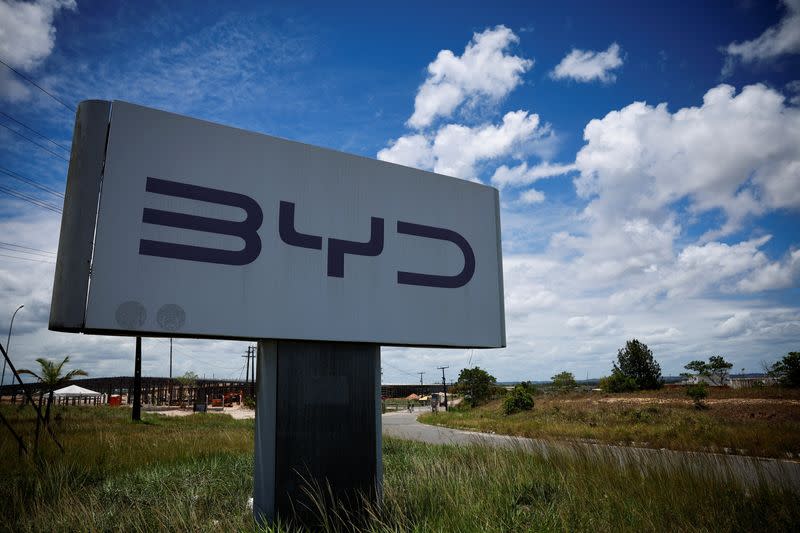China's BYD Capitalizes On Ford's Retreat In Brazil's EV Market

Table of Contents
Ford's recent scaling back of its electric vehicle (EV) operations in Brazil has created a significant opening in the burgeoning Brazilian EV market. This strategic retreat presents a golden opportunity for other players, and none have seized it more aggressively than BYD, the Chinese automotive giant. The implications of this shift are far-reaching, not only for Brazil's automotive industry but also for the global landscape of EV adoption and the increasing competitiveness of Chinese electric cars.
Ford's Departure Creates a Vacuum in the Brazilian EV Market
Analysis of Ford's Decision
Ford's decision to curtail its EV efforts in Brazil wasn't arbitrary. Several factors contributed to this strategic retreat. The Brazilian EV market, while showing potential, remains relatively underdeveloped compared to more mature markets like Europe or North America.
-
Decreased sales figures for Ford EVs in Brazil: Ford's EV sales in Brazil consistently lagged behind expectations, failing to gain significant traction against established players and newer entrants.
-
High manufacturing costs and low consumer demand: The high cost of producing and importing EVs, coupled with relatively low consumer demand due to high purchase prices and limited charging infrastructure, made the Brazilian EV market an economically challenging endeavor for Ford.
-
Lack of robust charging infrastructure: Brazil's charging infrastructure remains insufficient to support widespread EV adoption. This lack of readily available charging points significantly hampered consumer confidence and uptake of electric vehicles.
-
Government policies and incentives: While the Brazilian government has introduced some incentives to promote EV adoption, these have been deemed insufficient to overcome the existing market hurdles and stimulate the necessary level of growth.
BYD's Strategic Entry and Aggressive Expansion
BYD's Market Strategy in Brazil
BYD, known for its innovative battery technology and competitive pricing, is aggressively pursuing the opportunity left by Ford's departure. Their strategy is multifaceted:
-
BYD's competitive pricing compared to other brands: BYD's EVs are often priced more competitively than their rivals, making them more accessible to a wider range of Brazilian consumers.
-
Focus on specific EV models suited to the Brazilian market: BYD is offering a range of models designed to cater to the specific needs and preferences of the Brazilian market, considering factors such as climate, terrain, and consumer preferences.
-
Investment in charging infrastructure and partnerships with local businesses: Recognizing the importance of charging infrastructure, BYD is investing in and partnering with local businesses to expand charging networks across Brazil.
-
Localized marketing campaigns to target Brazilian consumers: BYD is employing localized marketing campaigns that resonate with Brazilian culture and values, fostering a strong brand presence. Models like the BYD Tang and BYD Han are already gaining traction.
The Implications for the Brazilian EV Market
Increased Competition and Market Growth
BYD's entry is dramatically reshaping the Brazilian EV market.
-
Potential for increased EV sales in Brazil: BYD’s presence is expected to stimulate overall EV sales, bringing more competition and potentially more affordable options to consumers.
-
Effect on pricing and consumer choice: The increased competition is likely to drive down prices and offer Brazilian consumers a greater variety of EV models to choose from.
-
Stimulation of the domestic EV industry: BYD's investment and presence could spur growth in the domestic Brazilian EV industry, fostering innovation and job creation.
-
Opportunities and challenges for other EV manufacturers in Brazil: Other manufacturers will need to adapt to the increased competition, possibly through innovation in technology, pricing strategies, or marketing efforts.
BYD's Global Strategy and the Brazilian Market's Significance
BYD's International Ambitions
BYD's move into Brazil is part of a larger global strategy. Already a leading EV manufacturer in China, BYD is aggressively expanding its international footprint.
-
BYD's market share in other key regions: BYD has already achieved significant success in several key markets, demonstrating its capabilities and competitive edge.
-
Comparison of the Brazilian market to other emerging markets: Brazil represents a significant opportunity for BYD, similar to other emerging markets where EV adoption is rapidly growing.
-
BYD's long-term vision for its presence in Latin America: Brazil serves as a crucial stepping stone for BYD's broader ambition to dominate the Latin American EV market.
Conclusion
Ford's retreat and BYD's aggressive expansion mark a turning point for the Brazilian EV market. BYD's competitive pricing, diverse model offerings, and commitment to infrastructure development are poised to accelerate EV adoption in Brazil. While challenges remain, the opportunities are substantial. The future of the Brazilian EV market will likely be defined by the ongoing competition and innovation driven by players like BYD. Follow the developments in Brazil's electric vehicle market as BYD continues its expansion, and stay tuned for further analysis on China's BYD's impact on the Brazilian EV market.

Featured Posts
-
 Karneval In Braunschweig 2025 Schoduvel Im Tv Und Livestream
May 13, 2025
Karneval In Braunschweig 2025 Schoduvel Im Tv Und Livestream
May 13, 2025 -
 Ekspos Foto Korban Penipuan Online Internasional Di Myanmar Termasuk Warga Negara Indonesia
May 13, 2025
Ekspos Foto Korban Penipuan Online Internasional Di Myanmar Termasuk Warga Negara Indonesia
May 13, 2025 -
 Review Of Earth Series 1 Episode 1 Inferno
May 13, 2025
Review Of Earth Series 1 Episode 1 Inferno
May 13, 2025 -
 Alarm An Braunschweiger Schule Aktuelle Informationen Zur Evakuierung
May 13, 2025
Alarm An Braunschweiger Schule Aktuelle Informationen Zur Evakuierung
May 13, 2025 -
 Analysis Leveraged Semiconductor Etf Outflows And Subsequent Market Rally
May 13, 2025
Analysis Leveraged Semiconductor Etf Outflows And Subsequent Market Rally
May 13, 2025
